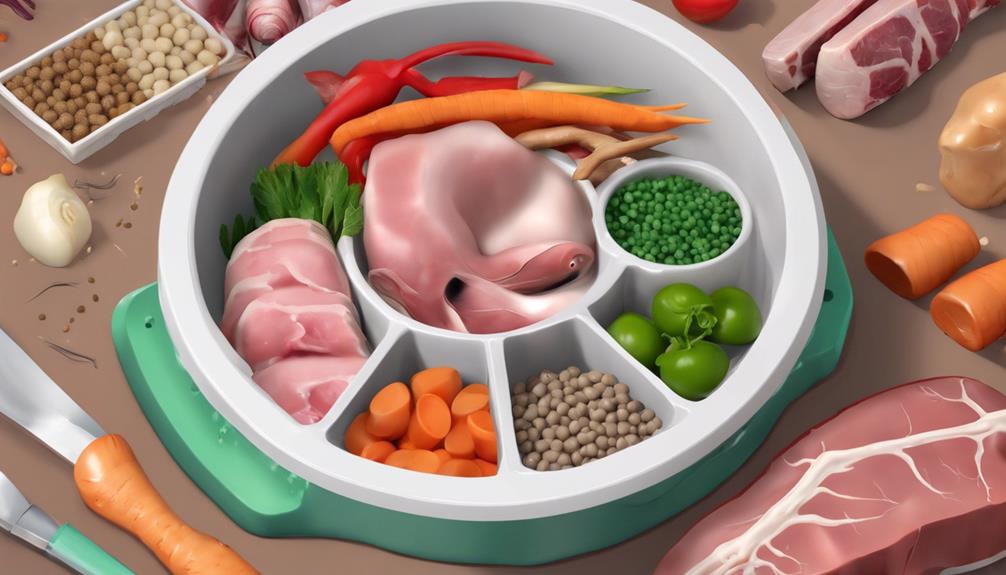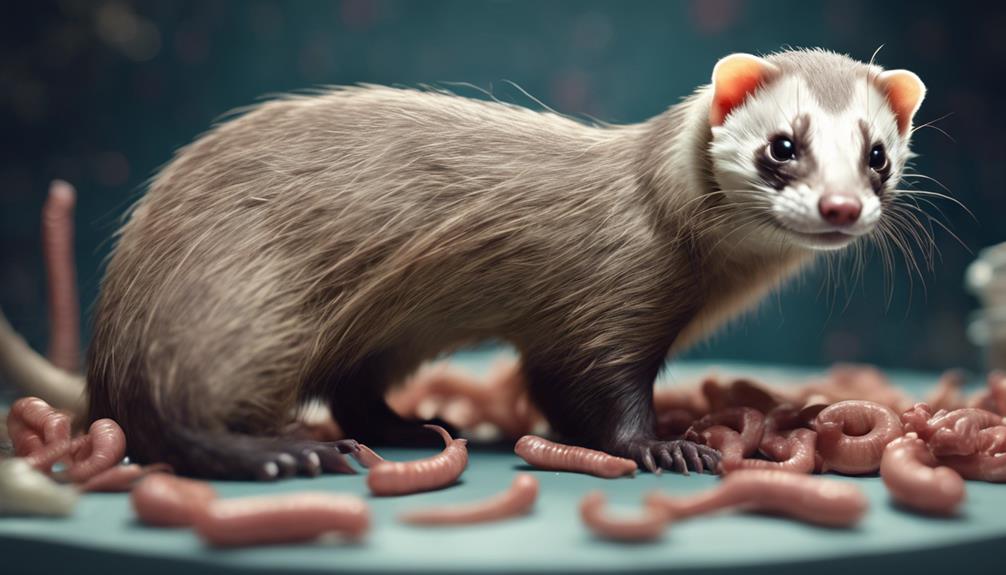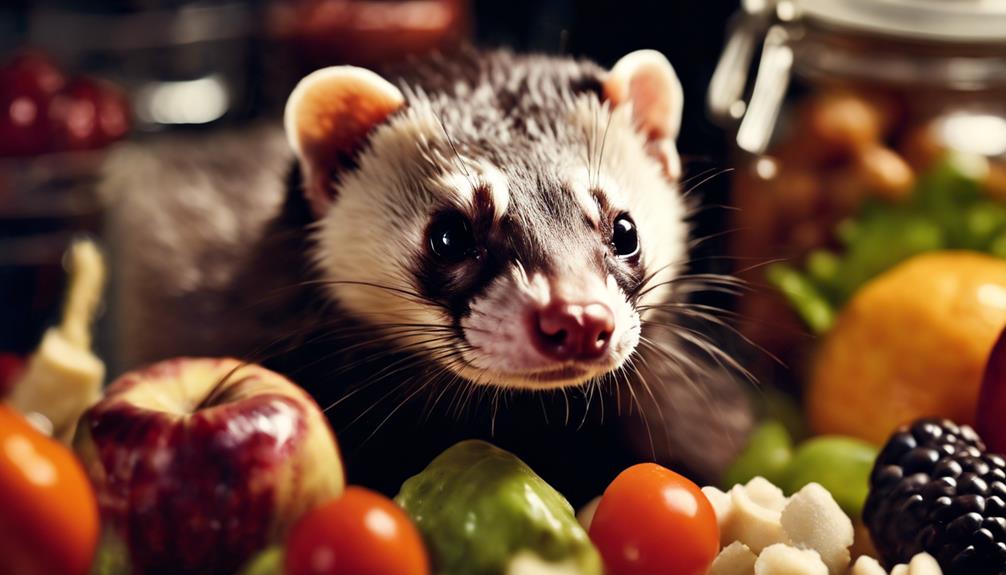Do Ferrets Need Supplements in Their Diet?

Ferrets have specific dietary requirements that need to be met for optimal health. These obligate carnivores need a diet high in animal protein and fat. High-quality ferret food that is specifically formulated for their nutritional needs should make up the majority of their diet. It is generally not necessary to supplement a ferret's diet with additional vitamins or minerals if they are eating a balanced diet. However, some ferrets may benefit from specific supplements, such as fatty acids or taurine, especially if they have certain health conditions. It is always best to consult with a veterinarian who is knowledgeable about ferret nutrition before adding any supplements to your ferret's diet.
The Basics of Ferret Nutrition
Understanding the fundamental principles of ferret nutrition is crucial for ensuring the health and well-being of these unique carnivorous animals. When it comes to ferrets, meal plans should be carefully designed to provide them with balanced diets that meet their specific nutritional needs. Ferrets are obligate carnivores, meaning their diet should consist mainly of animal-based proteins and fats. Including high-quality meat sources in their meal plans is essential to ensure they receive the necessary nutrients for optimal health.
Balanced diets for ferrets should include a variety of protein sources such as chicken, turkey, and beef. These proteins should be complemented with fats to mimic their natural diet in the wild. It's important to avoid feeding them carbohydrates, as their digestive systems aren't designed to process plant-based foods efficiently. By focusing on protein and fat-rich meal plans, ferret owners can help prevent common nutrient deficiencies and promote overall health in their furry companions.
Common Nutrient Deficiencies in Ferrets

Ferrets, like any other animal, are susceptible to nutrient deficiencies that can impact their health and wellbeing. Essential vitamins, minerals, and proteins play crucial roles in the overall health of ferrets.
Understanding these common nutrient deficiencies can help ferret owners provide a balanced and nutritious diet to support their pets' well-being.
Essential Vitamins for Ferrets
Vitamin deficiencies are a common health concern in ferrets, impacting their overall well-being and vitality. Ensuring adequate intake of essential vitamins is crucial for their health.
Here are some key points to consider:
- Vitamin Sources: Ferrets obtain vitamins primarily from their diet, especially from high-quality commercial ferret foods.
- Dietary Balance: Maintaining a balanced diet is essential to prevent vitamin deficiencies. Consult a veterinarian for guidance on suitable ferret diets.
- Vitamin A: Deficiency can lead to skin and coat issues, so include vitamin A-rich foods in their diet.
- Vitamin D: Inadequate levels can affect bone health; exposure to natural sunlight or providing a suitable supplement can help.
Ensuring proper vitamin intake is vital for your ferret's overall health and longevity.
Mineral Needs for Ferrets
Adequate mineral intake is essential for maintaining optimal health in ferrets, as deficiencies in key minerals can significantly impact their overall well-being and longevity. Ferrets require a delicate calcium balance to support bone health and muscle function. Insufficient calcium levels may lead to bone density issues and skeletal deformities.
Additionally, iron absorption is crucial for ferrets to prevent anemia and maintain proper oxygen transport in the body. Iron deficiency can result in lethargy, weakness, and a weakened immune system.
To ensure adequate mineral intake, ferrets' diet should include high-quality ferret food, occasional meat treats, and access to fresh water. Regular veterinary check-ups can help monitor mineral levels and address any deficiencies promptly.
Protein Requirements for Ferrets
Maintaining a sufficient protein intake is crucial for the health and well-being of ferrets, as deficiencies in this nutrient can lead to various health issues. When considering protein requirements for ferrets, it's essential to focus on the following key points:
- Meat sources: Ferrets are obligate carnivores and require high-quality protein from animal sources like meat to meet their nutritional needs effectively.
- Bioavailability: Proteins from meat sources have high bioavailability, ensuring that ferrets can easily absorb and utilize the essential nutrients.
- Digestive enzymes: Ferrets have specific digestive enzymes that are tailored for processing animal proteins efficiently.
- Absorption: Adequate protein intake is crucial for proper absorption of essential amino acids and overall nutrient balance in ferrets' diets.
Signs of Nutritional Imbalance

Detecting signs of an improper balance of nutrients in a ferret's diet is crucial for maintaining their health and well-being. Dietary sensitivities and health implications can arise when a ferret's diet lacks essential nutrients or contains an excess of certain components. Behavior changes and growth development may also be affected by nutritional imbalances. Below is a table summarizing common signs indicating a nutritional imbalance in ferrets:
| Signs of Nutritional Imbalance | Description |
|---|---|
| Weight Loss | Unintentional reduction in body weight despite a regular diet. |
| Dull Coat | Lackluster fur quality and increased shedding. |
| Lethargy | Decreased activity levels and interest in play. |
| Digestive Issues | Diarrhea, constipation, or vomiting may occur. |
These signs can serve as indicators that a ferret's diet needs adjustment to ensure they receive adequate nutrition for optimal health. Regular monitoring and consultation with a veterinarian can help address and prevent nutritional imbalances in ferrets.
Understanding Ferret Digestive System

To understand the dietary needs of ferrets, it's essential to comprehend their unique digestive system. Ferrets have a short gastrointestinal tract designed for a diet rich in animal proteins and fats. Here are some key points to consider regarding the digestive system of ferrets:
- Efficient Digestive Health: Ferrets have a fast metabolism, which requires high-quality, easily digestible food to meet their energy needs and maintain digestive health.
- Specialized Nutritional Absorption: The ferret's digestive system is adapted for the absorption of nutrients from animal-based sources. Therefore, their diet should consist mainly of meat-based proteins and fats.
- Sensitive Digestive System: Ferrets are susceptible to gastrointestinal issues if their diet isn't appropriate. Sudden dietary changes can lead to digestive upsets, emphasizing the need for a consistent and balanced diet.
- Balanced Nutrient Intake: Ensuring the right balance of nutrients is crucial for the overall health of ferrets, supporting their digestive system and promoting optimal nutritional absorption.
Factors Influencing Dietary Requirements

Factors influencing the dietary requirements of ferrets include their metabolic rate, age, and activity level. Ferrets have high metabolic rates, necessitating a diet rich in protein and fat. Young ferrets, known as kits, require a diet with higher fat content to support their growth and development. As ferrets age, their dietary requirements may change, requiring adjustments to ensure optimal health. Additionally, the activity level of a ferret impacts its nutritional needs. Highly active ferrets may require more calories to sustain their energy levels compared to less active ones.
Feeding habits also play a crucial role in determining a ferret's dietary requirements. Ferrets are obligate carnivores, meaning they need a diet primarily composed of animal-based protein. Providing a balanced diet that mimics their natural prey helps ensure they receive essential nutrients. Environmental factors, such as temperature and living conditions, can also influence a ferret's dietary needs. In colder environments, ferrets may require more calories to maintain their body temperature. Understanding these factors is essential for meeting the dietary requirements of pet ferrets.
Supplement Options for Ferrets

Ferrets' dietary needs can be further supported through the strategic use of appropriate supplements tailored to their unique nutritional requirements. When considering supplement options for ferrets, it's essential to prioritize supplement effectiveness and dosage to ensure optimal health benefits.
- Vitamin Supplements: Ferrets may require additional vitamins such as A, D, and E to maintain overall health. Ensure the supplements are specifically formulated for ferrets and adhere to recommended dosages.
- Omega-3 Fatty Acids**: Incorporating omega-3 fatty acids into a ferret's diet can support skin health and promote a shiny coat. Seek supplements derived from fish oils or flaxseed oil for their benefits.
- Probiotics: Probiotic supplements can aid in maintaining a healthy gut flora balance in ferrets, potentially improving digestion and overall well-being. Consult with a veterinarian for suitable probiotic options and dosages tailored to ferrets.
- Mineral Supplements**: Ferrets may benefit from mineral supplements like calcium or iron to address specific deficiencies. However, it's crucial to carefully monitor dosage levels to prevent any adverse effects on their health.
Consulting a Veterinarian for Guidance

When seeking guidance on supplementing a ferret's diet, consulting a veterinarian is essential to ensure the optimal health and well-being of your furry companion. Dietary consultation with a vet ensures that any supplements added to your ferret's diet are appropriate and safe.
Veterinarians can provide vet recommendations tailored to your ferret's specific needs, considering factors such as age, health status, and existing diet. They can also offer expert advice on achieving nutritional balance in your ferret's overall diet, taking into account the nutrients necessary for their growth and maintenance.
With their training and experience, vets can help you navigate the complex world of dietary supplements, steering you away from potential pitfalls and towards choices that will benefit your ferret's health. By consulting a veterinarian for guidance on supplementing your ferret's diet, you're taking proactive steps to ensure that your pet receives the best possible care and nutrition.
Frequently Asked Questions
Can Ferrets Safely Consume Fruits and Vegetables as Supplements in Their Diet?
Ferrets can safely consume fruits and vegetables as supplements in their diet. However, it is crucial to maintain nutritional balance to avoid potential risks. Their digestive system and absorption rates must be considered when introducing new foods.
Are There Specific Brands or Types of Supplements That Are Recommended for Ferrets?
When it comes to supplement brands for ferrets, it's essential to choose ones specifically formulated for them. Ensuring the correct dosage and frequency is crucial for their well-being, as improper use may not be as effective.
How Often Should Supplements Be Given to Ferrets to Maintain Optimal Health?
Feeding frequency plays a crucial role in maintaining a ferret's nutritional balance. Providing supplements in moderation can offer health benefits, but excessive intake may pose potential risks. It's essential to consult a veterinarian for tailored advice.
Are There Any Natural Alternatives to Store-Bought Supplements That Can Be Used for Ferrets?
Are there natural alternatives for ferrets' supplements? Herbal remedies and homemade options can be beneficial due to dietary restrictions. Prioritize natural alternatives that align with a ferret's nutritional needs for optimal health and well-being.
Can Certain Supplements Interact Negatively With Medications Commonly Prescribed for Ferrets?
Certain supplements can interact negatively with medications prescribed for ferrets, leading to health risks. Dosage considerations are crucial to avoid potential side effects. Consult a veterinarian to ensure compatibility and safety for your ferret.










